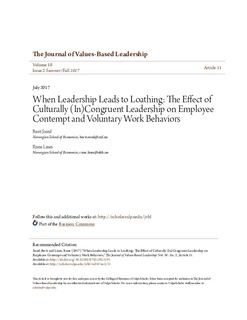| dc.contributor.author | Sund, Berit | |
| dc.contributor.author | Lines, Rune | |
| dc.date.accessioned | 2017-11-29T08:21:05Z | |
| dc.date.available | 2017-11-29T08:21:05Z | |
| dc.date.created | 2017-11-06T15:47:26Z | |
| dc.date.issued | 2017 | |
| dc.identifier.citation | The Journal of Values Based Leadership. 2017, 10 (2), . | nb_NO |
| dc.identifier.issn | 1948-0733 | |
| dc.identifier.uri | http://hdl.handle.net/11250/2468329 | |
| dc.description.abstract | This article suggests that contempt ― a proclivity towards
loathing others ― as an emotional response, can arise as a
consequence of culturally incongruent leadership, i.e. leader
behaviors and actions that do not comply with follower-held,
culturally derived expectations and values. Outcomes of
contempt were also studied by hypothesizing that contempt,
when experienced in response to a situation of culturally
incongruent leadership, can cause followers to reduce their
display of organizational citizenship behaviors (OCB) while
engaging in deviant behaviors. The model was tested in a
sample of 348 follower-level employees using structural
equation modeling. Empirical results largely support
theoretical hypotheses. Culturally congruent leadership was
negatively related to contempt, while contempt was positively
related to deviant behaviors and negatively related to OCB.
The results contribute to the understudied field of contempt
research, and suggest that leaders faced with cultural
diversity may be well advised to adapt their behaviors to the
local cultural values to stimulate follower OCB rather than
deviance. | nb_NO |
| dc.language.iso | eng | nb_NO |
| dc.title | When Leadership leads to Loathing: The Effect of Culturally (In)Congruent Leadership on Employee Contempt and Voluntary Work Behaviors | nb_NO |
| dc.type | Journal article | nb_NO |
| dc.type | Peer reviewed | nb_NO |
| dc.description.version | publishedVersion | nb_NO |
| dc.source.pagenumber | 21 | nb_NO |
| dc.source.volume | 10 | nb_NO |
| dc.source.journal | The Journal of Values Based Leadership | nb_NO |
| dc.source.issue | 2 | nb_NO |
| dc.identifier.doi | 10.22543/0733.102.1191 | |
| dc.identifier.cristin | 1511522 | |
| cristin.unitcode | 191,20,0,0 | |
| cristin.unitname | Institutt for strategi og ledelse | |
| cristin.ispublished | true | |
| cristin.fulltext | original | |
| cristin.qualitycode | 1 | |
